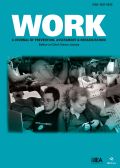Authors: Precin, Patricia
Article Type:
Research Article
Abstract:
This case study is a report of a rehabilitative employment program that used trauma focused group treatment with individuals who suffered from Posttraumatic Stress Disorder (PTSD) post 9/11. The program was developed in order to assist them to return to the work force. These Individuals lost their jobs because of the 9/11 terrorist attack and experienced financial difficulty, yet because of their PTSD symptoms, had difficulty seeking employment. Individuals were selected for group treatment based on
…the presence of PTSD symptoms as measured by The Posttraumatic Stress Diagnostic Scale, an external locus of control determined by the Internal and External Locus of Control Scale, low self-esteem as per the Self-Efficacy Scale, and hopelessness, as assessed through the Hopelessness Scale. Additional assessments (Role Checklist, Psychiatric Rehabilitation Determination, Vocational Sentence Completion, Activity Record of the Occupational Questionnaire, and an interview that included a work history) were administered by an occupational therapist. Results of these assessments were used to inform group co-leaders (one social worker and one occupational therapist per group) of their members' symptoms, coping mechanisms, attitudes towards work, rehabilitation readiness, life roles and values, and use of time in order to plan appropriate group intervention. Groups met for once-a-week 90 minute sessions. Group leaders used restructuring and systematic prolonged exposure to encourage group members to describe their traumatic experiences in order to neutralize negative affect states, mange symptoms, and work through guilt and distorted perceptions. Members attended until they began gainful employment. Descriptive data revealed that during the first year of the program, 9/11/2001-9/11/2002, 262 of the 3,567 clients seen (13.6%) returned to the work force.
Show more
Keywords: PTSD, trauma, employment, occupational therapy, vocational rehabilitation
DOI: 10.3233/WOR-2011-1099
Citation: Work,
vol. 38, no. 1, pp. 3-11, 2011
Price: EUR 27.50






